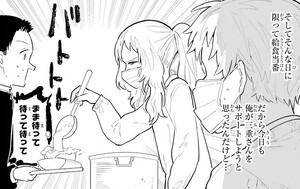Of all times to happen with 〜に限って
Grammar: Limit
〜に限って is used to emphasize an exception, a special case, or something that happens only under certain circumstances. In English, it can often be translated as “only in the case of…”, or “especially when…”, or “of all the times”.
Usage
This grammar typically highlights a situation that stands out as unexpected or contrary to what one might hope for. It is often used with negative or undesirable outcomes, having a sense of complaint, irony, or frustration, but it can also emphasize unique or specific cases.
It generally attaches to nouns indicating time, situations, or conditions to emphasize the untimely nature of an event.
Formation
- Noun + に + 限って
- 傘を持っていない日に限って雨が降った
- "Only on the day I didn't bring an umbrella, it rained."
Further Reading
- 〜に限って①(悪いことの発生)|日本語能力試験 JLPT N2 (edewakaru.com)
Examples
Lunch duty today of all days with 〜に限って

Komura and Mie have serving duty in the cafeteria. Normally this wouldn’t be an issue, except today Mie accidentally stepped on her glasses and broke them, and can barely see without them.
- 木村:
- 「そしてそんな日に限って給食当番」
- “Thus, on a day such as that (of all days), she has lunch duty.”
- 「だから今日も俺が三重さんをサポートしようと思っただけど…」
- “Therefore, I thought I'd support Mie, but...”
- 男の子:
- 「まま待って待って待って」
- “W-w-wait, wait, wait!”